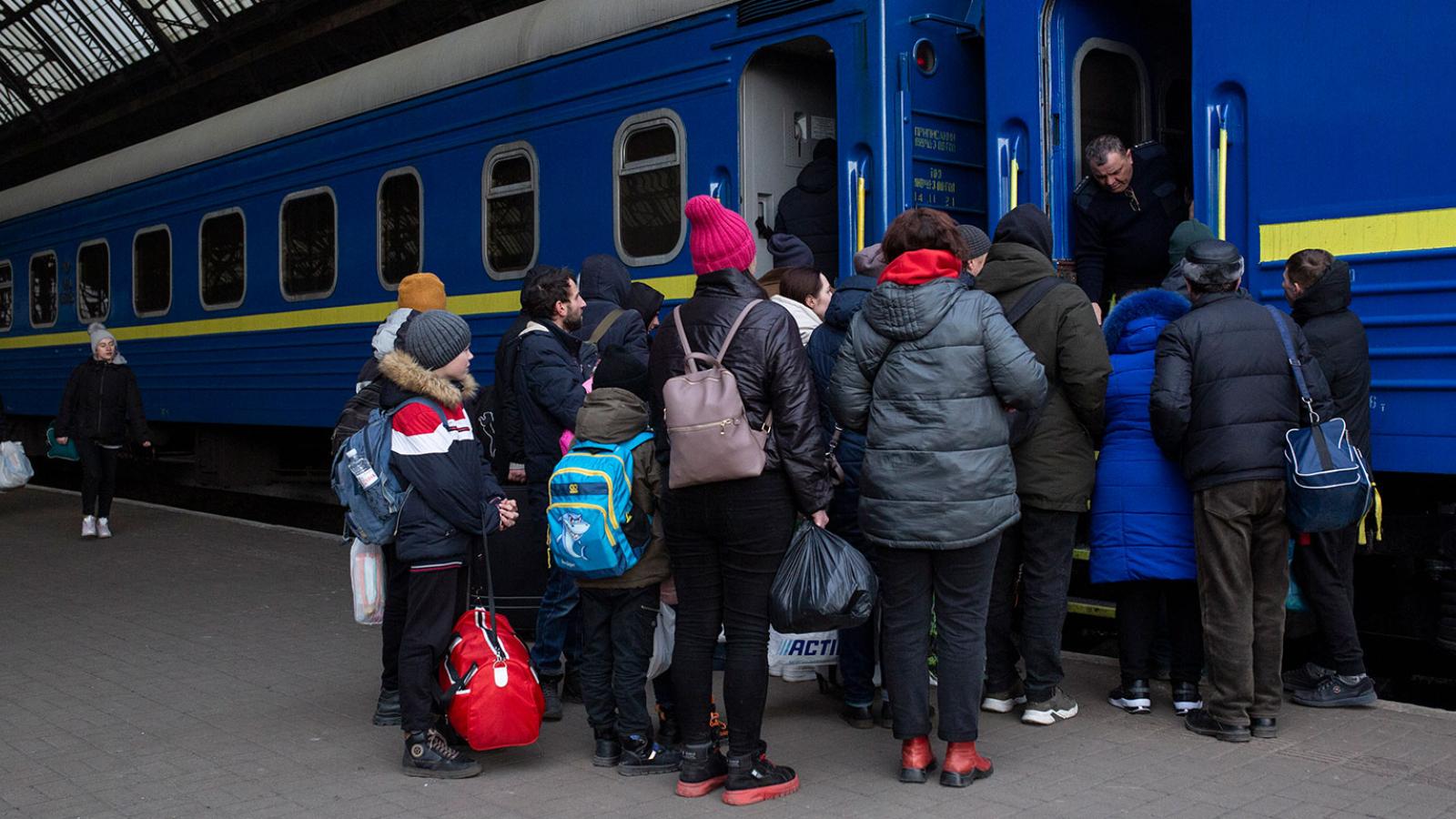Exploring Ukraine’s displacement crisis: insights and implications
The war on Ukraine has caused levels of forced displacement not seen in Europe since World War II. In the latest issue of Forced Migration Review, contributors offer nuanced explorations of the experiences of displaced Ukrainians and the international response, from legal rights and access to work, to language issues and holistic integration, and draw powerful lessons for the international refugee and asylum system.

Since February 2022 over 11 million Ukrainians have been forcibly displaced. Nearly 18 million are currently in need of humanitarian assistance. The articles in the latest issue of Forced Migration Review consider the needs and interests of displaced Ukrainians, the lessons that can be taken from the international response so far and the implications for the future.
What is different about this crisis?
Location
Of the more than 110 million people forcibly displaced worldwide, the vast majority live in low- or middle-income countries outside Europe. Over the past 18 months, Europe has seen its largest mass displacement since 1945. For the first time, the EU has implemented the Temporary Protection Directive (TPD) – enabling nearly five million Ukrainians to swiftly access international protection and other rights in European states.
Demographic trends: age, disability, statelessness and language use
The needs and interests of people forcibly displaced in and from Ukraine reflect the country’s demographic, historical and geographical context. More people over 60 are affected by conflict and displacement than in any other country. Connected to this, a high number of those who are displaced have disabilities. There are significant numbers of stateless people in Ukraine due to the history of the break-up of the USSR, as well as other minority groups, including minority language-speakers, who are at risk of being excluded from assistance or access to rights. Sensitivities around language use by service providers in the current conflict add complexity, as the difference between speaking Ukrainian or Russian has become highly politicised.
Volunteer-led humanitarian response
The humanitarian response to this crisis has been characterised by a surge in solidarity, with large numbers of volunteers and private citizens getting involved. This has led to more assistance for refugees, but it is not without complications. An article on protection against sexual abuse notes that many refugees expressed difficulty in assessing what offers of support are legitimate and whom to trust. Some may be unwilling to report abuse out of fear of appearing ungrateful.
Volunteer organisations are often unfamiliar with global standards on humanitarian practice around protection and neutrality, and may not think these standards are applicable to their organisation. An article on localisation in Ukraine notes that “Many Ukrainian groups… view their relief efforts as part of a whole-of-society resistance to the Russian invasion and, for them, the distinction between aid for soldiers versus civilians does not carry the same significance.” This poses challenges for international funders and others in the humanitarian community.
Insights and innovations
Provisions for Ukrainian refugees in different countries
In Europe, despite the implementation of the TPD, many Ukrainian refugees are still in a precarious situation and need improved access to decent work, education, and social and financial services. An article on Ukrainian refugees in Poland finds that there is a limit to the use of social protection in a humanitarian refugee context.
Other articles offer insights into the experiences of refugees in other European countries neighbouring Ukraine, as well as the United States, the Netherlands and the United Kingdom. A common theme is the unresolved question of how long refugees granted temporary protection will be allowed to stay. Living with this uncertainty places limitations on refugees’ ability to move forward with their lives.
A piece on pro bono collaboration by the legal community outlines collaboration between organisations offering legal information and advice to Ukrainian refugees arriving in Poland, Romania and Hungary. Ukrainian author Anna Kalinickenko writes: “I know from personal experience that when you are completely lost and frustrated, legal and informational support can be as important as humanitarian help.”
Hosting initiatives and community
Hosting initiatives, where households or communities offer to house individual refugees or families, offer scope for replication in future crises. The UK’s “Homes for Ukraine” scheme paired around 130,000 Ukrainians with hosts. Compared with the hotel housing used for Afghan refugees, Homes for Ukraine was a more cost-effective approach with better outcomes for refugees.
In the Netherlands, a small local municipality, a faith-based organisation and a secular grassroots organisation have collaborated effectively to host 130 refugees, providing not just accommodation but also pastoral care, access to support services, job coaches and social activities. The authors emphasise the importance of welcoming refugees into a community.
This sentiment is echoed in an article on research into promoting psychological well-being among displaced populations, which finds that having agency in problem solving and access to social support networks contributed to post-traumatic growth.
Digital technology
Smartphones and social media platforms are key sources of information for displaced Ukrainians seeking support. One project in Hungary has connected hundreds of thousands of individuals with refugee-serving organisations through Facebook. Organisers gathered details of refugees’ requirements from more than 50 locations, and published multilingual announcements sharing key information. (This article presages FMR’s forthcoming issue “Digital disruption and displacement” – we are currently accepting article proposals.)
Implications
The ultimate implications of the war on Ukraine, both locally and globally, are unclear. As the attention of countries in the Global North has been taken up by Ukraine, funding for other crises has fallen. The war has also had an impact on global food prices and energy costs, and these shocks will disproportionally affect forcibly displaced people, who often lack safety nets to fall back on.
Closer to the crisis, displaced Ukrainians are living with uncertainty over when the war will end – and their legal status and integration options in host countries. For those displaced into Russia, where the state’s approach to refugees is de facto naturalisation, it is unclear what return to Ukraine and reintegration might look like.
Amid all this uncertainty, the articles in this issue of FMR offer examples of innovation and learning. We hope they will generate discussion and fresh insights and, most importantly, contribute toward improving outcomes for people affected by forced migration around the world. We warmly invite you to browse and share all the articles in this issue (also available in Ukrainian and Russian). We also encourage you attend our online launch event on 17 October.
Please note you may not be able to access the issue if you are using the Oxford University VPN.

